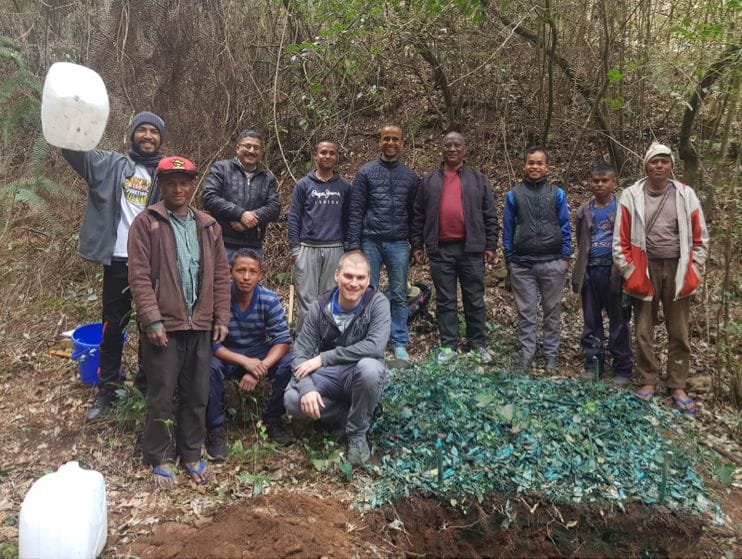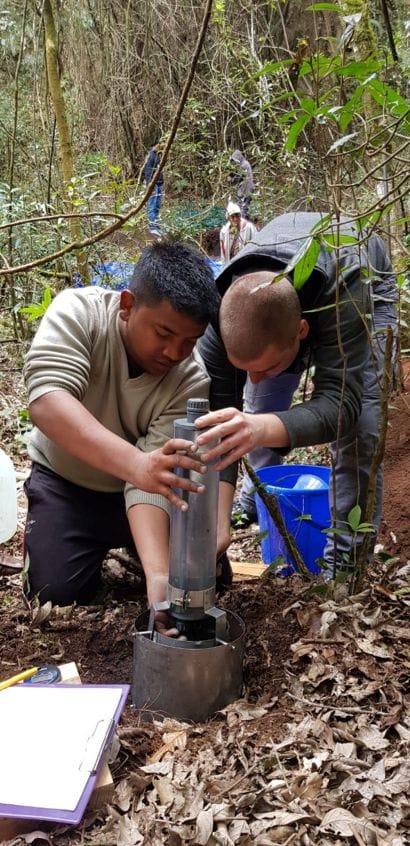For an area dubbed the ‘wettest place on Earth’ it may seem unimaginable that the Khasi communities of India’s Meghalaya state face periodic water shortages. However, this is now their reality as high historical rates of deforestation and land degradation have contributed to a decline in the hydrological functioning of the Umiam river watershed. Forest and water processes are intricately linked; this fact is widely recognised not only by the international scientific community but also by local forest communities like the Khasi. Significant loss of forest cover and species diversity can reduce the movement of water through soils and increase water lost through surface runoff and evaporation from bare ground, resulting in reduced dry season water availability.
WeForest has been working with the Khasi Hills Federation to restore native forest and improve local livelihoods since 2014. More recently, we have begun to address concerns raised by the community and the Federation about water scarcity and declining water quality in the East Khasi Hills area. During April 2017 in Khasi Hills, WeForest launched a forest-water capacity building programme. This programme, delivered in collaboration with FAO, aims to build local capacity in forest-water management and monitoring2. The programme is a key element of our ongoing commitment to further the International Forests and Water Agenda, and advance knowledge on the forest-water-climate nexus through undertaking applied research.
Our first capacity building workshop saw WeForest and FAO experts, local government officials and University staff join the Khasi technical and community teams to strengthen knowledge on local forest-water processes and to develop an integrated forest-water management and monitoring plan for the area. The workshop was well attended and well received by all – there was also time to put theory into practice by installing rain gauges (to measure rainfall) and collecting data in the field3.
“The workshop was a knowledgeable one; I learnt about the forest-water relations, how to monitor and how important are forests not only to humans and wildlife but to water as well, which ultimately is the basic need of humans” – Khasi Hills Workshop Participant (April 2017).


Since then, we sent a small science team of two forest hydrologists back to Khasi Hills during February 2018 to follow-up on last year’s workshop. This time the focus was to expand the technical capacity and field skills of the Khasi Hills team in measuring and reporting key forest-water indicators. The Khasi technical team were given extensive hands on training in using infiltrometers to measure the rate of water movement through soil, collecting soil samples for lab analysis and conducting dye tracer measurements to look at water movement pathways and patterns through soil.
The data collected during this intensive 8 day field training session will contribute to ongoing monitoring efforts and will also help to guide further restoration activities in the area.
Fieldwork wasn’t without its challenges as the team encountered steep slopes making carrying equipment difficult and taking measurements in shallow degraded soils proved difficult at times.
However, the feedback received from the team was very positive – it seems field training is an effective way to help reinforce knowledge, instill confidence and boost the team’s enthusiasm for new activities!
WeForest will continue to work in collaboration with the communities and the Federation of Khasi Hills with further workshops planned in the near future.
We are also expanding our programme to organise a forest-water capacity building workshop in Ethiopia. This workshop will be delivered in collaboration with FAO and with the support of GIZ during June 2018.
HQ (BE): WeForest asbl/vzw
Cantersteen 47, 1000 Brussels, Belgium
VAT number BE0826.151.968
Incorporated May 26th 2010
WeForest is a supporting member of:





| Cookie | Duration | Description |
|---|---|---|
| __cf_bm | 1 hour | This cookie, set by Cloudflare, is used to support Cloudflare Bot Management. |
| _GRECAPTCHA | 6 months | Google Recaptcha service sets this cookie to identify bots to protect the website against malicious spam attacks. |
| cookielawinfo-checbox-analytics | 11 months | This cookie is set by GDPR Cookie Consent plugin. The cookie is used to store the user consent for the cookies in the category "Analytics". |
| cookielawinfo-checbox-functional | 11 months | The cookie is set by GDPR cookie consent to record the user consent for the cookies in the category "Functional". |
| cookielawinfo-checbox-others | 11 months | This cookie is set by GDPR Cookie Consent plugin. The cookie is used to store the user consent for the cookies in the category "Other. |
| cookielawinfo-checkbox-advertisement | 1 year | Set by the GDPR Cookie Consent plugin, this cookie records the user consent for the cookies in the "Advertisement" category. |
| cookielawinfo-checkbox-necessary | 11 months | This cookie is set by GDPR Cookie Consent plugin. The cookies is used to store the user consent for the cookies in the category "Necessary". |
| cookielawinfo-checkbox-performance | 11 months | This cookie is set by GDPR Cookie Consent plugin. The cookie is used to store the user consent for the cookies in the category "Performance". |
| CookieLawInfoConsent | 1 year | CookieYes sets this cookie to record the default button state of the corresponding category and the status of CCPA. It works only in coordination with the primary cookie. |
| elementor | never | The website's WordPress theme uses this cookie. It allows the website owner to implement or change the website's content in real-time. |
| JSESSIONID | session | New Relic uses this cookie to store a session identifier so that New Relic can monitor session counts for an application. |
| Path | session | Description is currently not available. |
| viewed_cookie_policy | 11 months | The cookie is set by the GDPR Cookie Consent plugin and is used to store whether or not user has consented to the use of cookies. It does not store any personal data. |
| Cookie | Duration | Description |
|---|---|---|
| _hjAbsoluteSessionInProgress | 1 hour | Hotjar sets this cookie to detect a user's first pageview session, which is a True/False flag set by the cookie. |
| _hjIncludedInSessionSample_2773626 | 1 hour | Description is currently not available. |
| aka_debug | session | Vimeo sets this cookie which is essential for the website to play video functionality. |
| authstrategy | session | Description is currently not available. |
| li_gc | 6 months | Linkedin set this cookie for storing visitor's consent regarding using cookies for non-essential purposes. |
| lidc | 1 day | LinkedIn sets the lidc cookie to facilitate data center selection. |
| pll_language | 1 year | Polylang sets this cookie to remember the language the user selects when returning to the website and get the language information when unavailable in another way. |
| UserMatchHistory | 1 month | LinkedIn sets this cookie for LinkedIn Ads ID syncing. |
| Cookie | Duration | Description |
|---|---|---|
| SRM_B | 1 year 24 days | Used by Microsoft Advertising as a unique ID for visitors. |
| Cookie | Duration | Description |
|---|---|---|
| _ga | 1 year 1 month 4 days | Google Analytics sets this cookie to calculate visitor, session and campaign data and track site usage for the site's analytics report. The cookie stores information anonymously and assigns a randomly generated number to recognise unique visitors. |
| _ga_* | 1 year 1 month 4 days | Google Analytics sets this cookie to store and count page views. |
| _gcl_au | 3 months | Google Tag Manager sets the cookie to experiment advertisement efficiency of websites using their services. |
| _hjFirstSeen | 1 hour | Hotjar sets this cookie to identify a new user’s first session. It stores the true/false value, indicating whether it was the first time Hotjar saw this user. |
| _hjSession_* | 1 hour | Hotjar sets this cookie to ensure data from subsequent visits to the same site is attributed to the same user ID, which persists in the Hotjar User ID, which is unique to that site. |
| _hjSessionUser_* | 1 year | Hotjar sets this cookie to ensure data from subsequent visits to the same site is attributed to the same user ID, which persists in the Hotjar User ID, which is unique to that site. |
| ajs_anonymous_id | 1 year | This cookie is set by Segment to count the number of people who visit a certain site by tracking if they have visited before. |
| ajs_group_id | 1 year | This cookie is set by Segment to track visitor usage and events within the website. |
| ajs_user_id | 1 year | This cookie is set by Segment to help track visitor usage, events, target marketing, and also measure application performance and stability. |
| AnalyticsSyncHistory | 1 month | Linkedin set this cookie to store information about the time a sync took place with the lms_analytics cookie. |
| CLID | 1 year | Microsoft Clarity set this cookie to store information about how visitors interact with the website. The cookie helps to provide an analysis report. The data collection includes the number of visitors, where they visit the website, and the pages visited. |
| CONSENT | 2 years | YouTube sets this cookie via embedded YouTube videos and registers anonymous statistical data. |
| MR | 7 days | This cookie, set by Bing, is used to collect user information for analytics purposes. |
| s_vi | 2 years | An Adobe Analytics cookie that uses a unique visitor ID time/date stamp to identify a unique vistor to the website. |
| SM | session | Microsoft Clarity cookie set this cookie for synchronizing the MUID across Microsoft domains. |
| VISITOR_PRIVACY_METADATA | 6 months | Description is currently not available. |
| vuid | 1 year 1 month 4 days | Vimeo installs this cookie to collect tracking information by setting a unique ID to embed videos on the website. |
| Cookie | Duration | Description |
|---|---|---|
| ANONCHK | 10 minutes | The ANONCHK cookie, set by Bing, is used to store a user's session ID and verify ads' clicks on the Bing search engine. The cookie helps in reporting and personalization as well. |
| bcookie | 1 year | LinkedIn sets this cookie from LinkedIn share buttons and ad tags to recognize browser IDs. |
| bscookie | 1 year | LinkedIn sets this cookie to store performed actions on the website. |
| IDE | 1 year 24 days 1 minute | Google DoubleClick IDE cookies store information about how the user uses the website to present them with relevant ads according to the user profile. |
| li_sugr | 3 months | LinkedIn sets this cookie to collect user behaviour data to optimise the website and make advertisements on the website more relevant. |
| muc_ads | 1 year 1 month 4 days | Twitter sets this cookie to collect user behaviour and interaction data to optimize the website. |
| MUID | 1 year 24 days | Bing sets this cookie to recognise unique web browsers visiting Microsoft sites. This cookie is used for advertising, site analytics, and other operations. |
| personalization_id | 1 year 1 month 4 days | Twitter sets this cookie to integrate and share features for social media and also store information about how the user uses the website, for tracking and targeting. |
| test_cookie | 15 minutes | doubleclick.net sets this cookie to determine if the user's browser supports cookies. |
| VISITOR_INFO1_LIVE | 6 months | YouTube sets this cookie to measure bandwidth, determining whether the user gets the new or old player interface. |
| YSC | session | Youtube sets this cookie to track the views of embedded videos on Youtube pages. |
| yt-remote-connected-devices | never | YouTube sets this cookie to store the user's video preferences using embedded YouTube videos. |
| yt-remote-device-id | never | YouTube sets this cookie to store the user's video preferences using embedded YouTube videos. |
| yt.innertube::nextId | never | YouTube sets this cookie to register a unique ID to store data on what videos from YouTube the user has seen. |
| yt.innertube::requests | never | YouTube sets this cookie to register a unique ID to store data on what videos from YouTube the user has seen. |
| Cookie | Duration | Description |
|---|---|---|
| __tld__ | session | Description is currently not available. |
| ajscookies | 1 year | No description available. |
| ajstest | 1 year | No description available. |
| debug | never | No description available. |